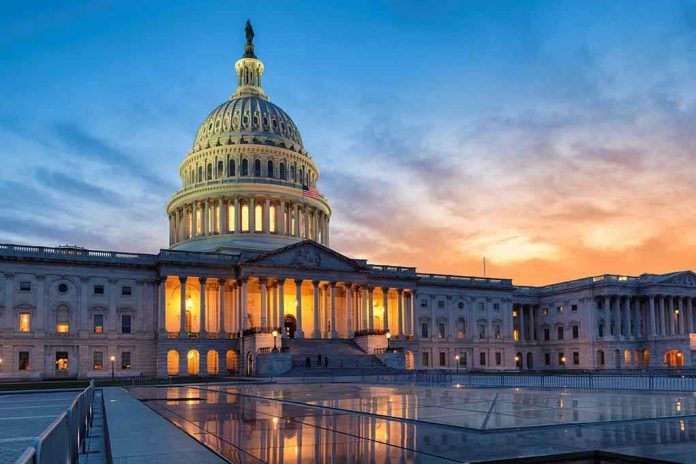
Congressional leaders are pulling out all the stops to prevent President Trump from making recess appointments, turning a routine August break into a dramatic showdown over constitutional power and party loyalty.
At a Glance
- House Speaker Mike Johnson and Senate Majority Leader John Thune will call pro-forma sessions every four to five days during the August recess to block Trump’s recess appointments.
- Pro-forma sessions are a legally upheld tactic that technically keeps Congress in session, stripping the president of power to make temporary appointments without Senate approval.
- This maneuver highlights fierce internal GOP disputes and the growing influence of megadonors like Elon Musk on legislative priorities.
- Experts warn the strategy could deepen partisan divides and further erode public trust in Congress.
Congressional Leaders Use Rare Tactic to Block Trump’s Recess Appointments
House Speaker Mike Johnson and Senate Majority Leader John Thune are set to convene pro-forma sessions every four to five days throughout the August 2025 recess, a calculated move designed to prevent President Trump from bypassing the Senate and installing his preferred nominees through recess appointments. This isn’t just procedural tinkering—this is a direct response to both intra-party squabbles and White House pressure to fill critical vacancies without the usual confirmation battles. The maneuver, while dry on its face, is a potent constitutional lever that has become ground zero for the fight over executive versus legislative power.
👇
Massie, Johnson Plan to Call House, Senate Into Session Every Five Days During August Recesshttps://t.co/B1qhx08Ehy— Inform America Now (@Ian_inform) July 26, 2025
Both Johnson and Thune have been under the spotlight, not only from the White House but from the conservative base and high-profile donors like Elon Musk, who have publicly lambasted them for sluggishness on key legislative priorities and fiscal discipline. The decision to deploy pro-forma sessions is as much about checking presidential authority as it is about ensuring the Republican leadership maintains control of the Senate floor—and their own party narrative. The Supreme Court’s 2014 Noel Canning decision affirmed the tactic’s legality, ensuring that these brief, sparsely attended sessions will stand up to legal scrutiny, no matter how much it aggravates those eager for a clean break from the status quo.
Inside the GOP: Tension, Donor Pressure, and Procedural Warfare
The use of pro-forma sessions is hardly new, but the current context is supercharged by a Republican civil war playing out on the national stage. Johnson and Thune are navigating not just the usual Democratic opposition but a growing chorus of criticism from within their own ranks and from influential conservatives outside of Congress. Elon Musk, in particular, has taken to social media and donor events to slam GOP leaders for what he sees as a lack of urgency on spending cuts and government reform. This public pressure has only intensified the scramble to keep Trump’s hands tied during the recess, all while trying to avoid further alienating the conservative base that expects action, not excuses.
GOP leaders are also facing backlash for sending the House home early, a move that infuriated members who wanted to keep the pressure on the White House over appointments and policy. Johnson’s strategy of calling frequent pro-forma sessions is a way to appease critics while also maintaining the upper hand in a constitutional chess match. It’s a risky play that risks fueling more internal resentment but, for now, keeps Trump’s executive ambitions in check.
What This Means for Trump, Congress, and the Country
For President Trump, the message could not be clearer: Senate confirmation remains the only path forward for his appointees, at least until the next session. This may slow down the installation of key officials, including those vital to advancing Trump’s agenda. For Johnson and Thune, it’s a demonstration of procedural muscle that could either cement their leadership or backfire spectacularly if the base turns on them for “playing games” instead of delivering results. For the American public—already weary of partisan gridlock and procedural showdowns—this latest maneuver is likely to deepen frustration with a government that seems more interested in self-preservation than problem-solving.
Legal and political analysts agree: while pro-forma sessions are a legitimate tool, their repeated use underscores just how far Congress is willing to go to prevent what they see as executive overreach. Some experts warn that if this brinkmanship continues, it could permanently damage the spirit of constitutional governance, making every appointment and every recess a potential flashpoint in the ongoing battle for control. As the August recess unfolds, all eyes are on Capitol Hill to see whether this gambit will hold—or whether it will simply add fuel to an already raging fire of partisan distrust.
Sources:
Arnold & Porter Legal Analysis












